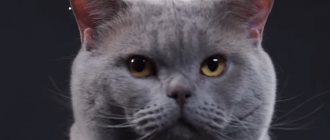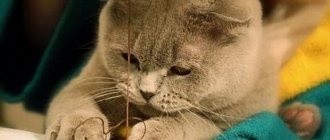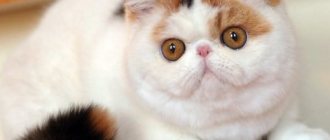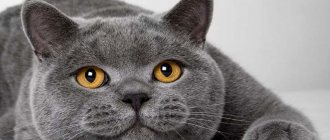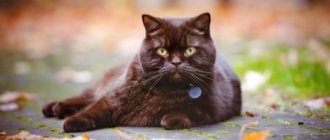Features of behavior and character of British women
When characterizing British cats, you need to understand that everything depends on their behavior. If you want to raise an animal, then you need to do this only up to a year, after which you won’t be able to change anything. Some owners complain about disobedience, not realizing that this is a consequence of poor upbringing . The British are proud enough that they will never ask a person for help. These are not the breeds that will cuddle or purr plaintively, trying to attract attention. These representatives will try to act independently.
While still babies, British kittens easily learn to use the litter box. The aristocratic breed does not allow them to shit wherever they have to. If you look at how a cat sleeps, you can involuntarily smile: on its back, in a ball, with its hind legs outstretched, on its side. The places to sleep are no less fun. Sometimes fluffy hides in places where you wouldn’t even think of looking for him - in a laundry basket or among soft toys. The habits of the British dog are often unpredictable, but this is dictated by the breed and some inherent instincts.
Cleanliness
Each cat approaches its appearance with special responsibility. British Shorthairs will look perfect in any circumstances. Like real aristocrats, they will spend hours getting their paws, antennae and fur in order. Sometimes, self-care for cats of this breed is a great way to relieve stress and bring yourself to psychological calm.
Licking is not just a way for a cat to groom itself. This ritual can be interpreted in different ways:
- Mean support or attention to other animals living in the house;
- A mother cat licks an angry kitten to calm it down;
- Licking is a sign of friendship and trust, that is, a cat will never lick a pet that is unpleasant to it.
Kittens begin to repeat this ritual after adults at 5-6 weeks, maintaining it into adulthood.
Character of British cats
Multifaceted and contradictory - this is how the character of “aristocratic animals” can be briefly described. Representatives of the British differ significantly in disposition from other cat breeds.
They never:
- They won’t sit in the kitchen and yell for food to be poured into them.
- They will not ask to be held by their owner, and will not sit on their laps if you take them by force.
- They won’t rub against their owner for days.
Cats spend all their free time to their advantage and do what they want. The British are independent and proud.
Cleanliness
Cleanliness is something that cannot be taken away from British women . This is inherent in them, this is what their mother cat teaches them. Purrs can lick themselves for hours without getting tired, and until the procedure is completely completed, they will not switch to another activity.
Representatives of this breed will not allow themselves to tear up furniture if they have a nail clipper for this purpose. Having shown the animal a couple of times the place reserved for sharpening nails, they will remember it forever.
Mind
The British are not short on intelligence. Tangles understand everything almost the first time. The only task that lies with the owner is to initially show the animal where to go to the toilet, where is the place to eat, where is the lounger, and the like.
Amenability
The British Shorthair cat gets along well with any animal, be it dogs, cats, parrots, iguanas and other representatives of the “wild world”. If a Briton doesn’t like something, he will not tolerate the disgrace that is happening next to him, but will turn around and proudly leave.
The same applies to children: when kids don’t touch cats, they don’t pay attention to them. Otherwise, the felines get up and go home.
Stubbornness and touchiness
All cats are stubborn in their own way, and the same applies to the British. Speaking about the character of British cats, it would not be out of place to say that they do everything according to their own wishes and at their own discretion. If a furry friend doesn’t want to lick him out of his house to play in the cold season, for example, then you can’t force him to do it. Of course, you can shake the animal out by force, but it will immediately find a place where no one will disturb it.
As for touchiness, pets have plenty of this. If the owner scolded the four-legged animal undeservedly or suddenly raised his hand to it, one should expect trouble. The cat will not forgive this, so it will sit in the shelter for a long time, and then refuse to eat.
Important! To avoid having to scold an adult cat for the slightest misdeeds, kittens should be taught order from childhood, instilling in them certain skills.
Restraint
The character of British cats is such that they do not like to show tenderness, love or resentment towards people, and especially in front of strangers. When an animal is offended, it will lick itself for a long time, thus relieving stress. A joyful bundle can make a circle of honor around a person, and then climb into its house or go to another favorite place. Only some representatives of the British can be gentle and loving, but this is due to the merit of the person who taught the animal to do this from childhood.
Playfulness
A cat's life consists of more than just sleep and food. Games play a big role for felines. The British are big fans of fooling around, of course, within the limits of what is permitted. An exception may be adult cats, although they can sometimes be caught doing this.
Kittens are overly selective in their games. What they like most is hiding and emerging from their ambush. Attacking is another fun activity for them. In this way, they try to imitate adult representatives who, in a playful way, teach their children to attack and also defend themselves. Sometimes, when kittens are tired, they pretend to sleep so that they can be left for a while. And after a short period of time, they pick up, raising their tail, and begin to chase their prey again.
Animals associate some toys with real prey - mice or rats. Swinging objects may remind four-legged birds of birds or butterflies that they so want to catch. At the same time, animals understand perfectly well that when playing, they are not hunting anyone, so they behave somewhat differently. When tracking real prey, the pets are serious and attentive, sometimes the cats are angry, but you can’t do without this when hunting. At home, they rarely release their claws, and their bites do not hurt at all.
Knowing the character of the British, many breeders recommend that owners set up a small corner for their pets, throwing small toys and strings there. If a person does not have time to play with his four-legged pet, then he needs to be given the opportunity to occupy himself independently.
Important! Cats who are not given time and who do not have toys begin to play mischief: jumping on furniture, hanging on curtains, knocking down everything in their path. And this is not the fault of the animals, but of the people who did not provide their pets with everything they needed.
Description of the breed
The British head has a round, regular shape with pronounced rump or cheeks. The nose is short, but smooth and wide. The ears are small, there are two types - slightly rounded, widely spaced and drooping at the tips to the bottom - fold-eared breed. Both types of ears have a wide base. The eyes are quite large, round in shape, widely set, the color is mostly rich golden.
The body of purebred British is muscular, with a wide chest and back, the animal is quite strong and agile. The tail is of medium size in thickness and length; it cannot be called thin and long. In terms of weight category, adult cats are somewhat heavier than cats: males weigh about 5-8 kg , females are smaller - from 4 to 6 kg .
Based on the type of coat, they are distinguished: long-haired and short-haired, but both types have an average length, there is no very noticeable difference - some have wool that is fluffier and longer, smooth, without curls, while others have short, straight, denser hair.
The coat color is even and uniform throughout the body . There are more than thirty varieties of color variations: red, white, gray, cream, black, combining several shades (gray, pink and gray), marble, gray-blue.
The character of the British is characterized by waywardness, partly even touchiness; they are proud and independent.
Psychology of British cats
The character and behavior of a British cat can be very different. However, the key determining factor is the animal's mood. The owner himself can spoil it or, on the contrary, improve it. Despite the fact that the pet is self-sufficient and can be alone for a long time, it cannot be ignored.
Some owners of four-legged animals complain that with the appearance of a child or another animal in the family, the British change, become closed and touchy. This happens because no one pays attention to the furry friend; they found a replacement for him. The British actually become very attached to their owners, but only because of their disposition do they not show it. However, this does not mean that animals can live on their own; they also want to be handled and noticed.
Habits
The bright character traits of the British directly influence their habits. Some people believe that since animals belonging to the presented breed are quite obedient, then they cannot do any bad things, but this is not so.
Common negative habits include:
- Scratching and biting hands.
- Throwing objects off surfaces.
To somehow compensate for this, many people want to know how the British are doing with catching mice, and this is a completely different matter.
Catching mice
British cats are often called clumsy. It is impossible to argue with this, but this does not prevent them from being excellent rat-catchers and mouse-catchers. If you believe history, the French always took cats of these breeds with them on voyages so that they would keep an eye on supplies and leave no chance for rodents to profit from various delicacies.
It is rare to find mice in modern apartments, so even with a strong desire, it would be difficult for cats to try to hunt someone. Another thing is animals that live in private sectors and in dachas. Pet owners have repeatedly noted that cats are very agile and excellent hunters. Some people believe that since they managed to cope with the rodent, they should definitely feast on it, but this is not so. Representatives of felines catch mice and rats for fun, they do not even understand that this is food that should be eaten. The reason lies in the character of the British cat, which was taught from childhood to a place for food. Having played enough, the animal leaves its prey and goes on about its business.
Biting and scratching
Scratching and biting the hands of their owners is a favorite activity of four-legged animals. At the age of three or four months, the kitten begins to bite the hands and sometimes the legs of a person. This is directly related to the change of teeth in animals. There is no need to think that such a habit will go away on its own. If the situation continues for a month, the animal will realize that it is possible to do this and in the future you will not wean it from it. At the same time, there is no need to try to beat the baby or shout at him; it is not his fault that his teeth itch. It needs to be done much simpler - during an attack, put a soft toy or mouse on your hand, which will interest the pet and become its favorite victim in the future.
Dropping items
Throwing objects off the table is an equally interesting activity. It can be anything, from a pen to a flower pot. Among the main character traits, self-indulgence is not listed among the British, but for them it is not self-indulgence, but curiosity. Cats are very interested to see how the object will fly down and what will happen to it after. If you want to stop this, then you should either sprinkle the surface with a pungent odor that animals cannot tolerate, or make the surface so that the pet does not have the slightest chance of climbing on it. At the same time, you must not forget about toys for your pet so that he does not have to get bored.
About activity
The character of British kittens, like cats, can actually be reserved and sometimes even cold, but this does not in any way affect their activity. The British sleep a lot, but in their free time they will do what they want: run, jump, play. The exception in this case is only older representatives of the breed. Pets that have access to the street are more active. They are interested in everything around them: leaves, butterflies, flowers, so cats can spend hours on end outside. If there are several cats in the family, then additional activity will be provided. This is very good, since active animals have much fewer health problems.
Important! To prevent your cat from lying around in the apartment, you should play with him from time to time and offer him some options for useful ways to spend his waking hours.
Do the British have bad habits?
It is believed that aristocrats do not and cannot have bad habits. Of course, the behavior of British cats may sometimes not fit into the generally accepted framework of these peculiar animals, but in any case, representatives of other breeds should be compared to them. This is not entirely true.
There are several bad habits of British cats that you should be aware of:
- Using the owner's personal belongings as toys, as well as items that cannot be used for these purposes. We can talk about jewelry, tubes of creams, sweets. If there is no fear that the animal will take these items somewhere, then you should not take them from him. The kitten will frolic a little and will lose all interest in what was just found. Otherwise, it is better to pick up the item, but be sure to exchange it for any other one.
- Some animals love to climb inside bags, boxes, packages and cabinets. It is difficult to find an explanation for this, but this does not mean that the pet will immediately stop doing this. In this case, you can also do it in two ways - allow it to be done or try to wean it off by replacing one activity with another.
Britons may actually be skittish animals, but they are also very intelligent, playful and active pets.
Did you like the article?
Owners' opinion
Domestic British cats. Character, reviews:
- For many people, the waywardness of the British does not seem to be a problem. You can get used to it. If you are patient, show love and care, the cat will reciprocate;
- Many people like the ease of care associated with natural cleanliness. Still, when your corners, sofas and slippers remain intact, it’s nice.
So, according to most owners, this cat is a gift from fate. She is kind, calm, and adequate from a very early age. Fortunately, the character of any purebred British cat is quite acceptable even for a family with a small child.
psychology of catscharacter Sources used:
- https://plusiminusi.ru/britanskie-koshki-plyusy-minusy-i-osobennosti/
- https://kotikdoma.com/porody-koshek/britanskie-i-shotlandskie/kharakter-britanskikh-koshek.html
- https://brit-cats.ru/vospitanie-kotenka/harakter-britanskoj-koshki/
